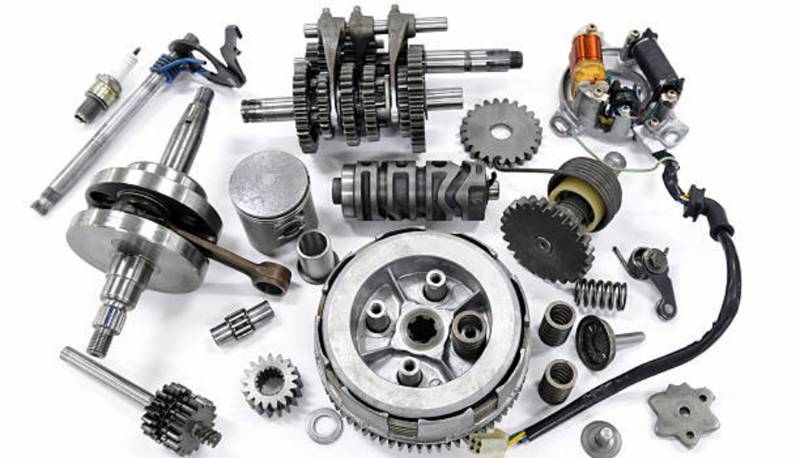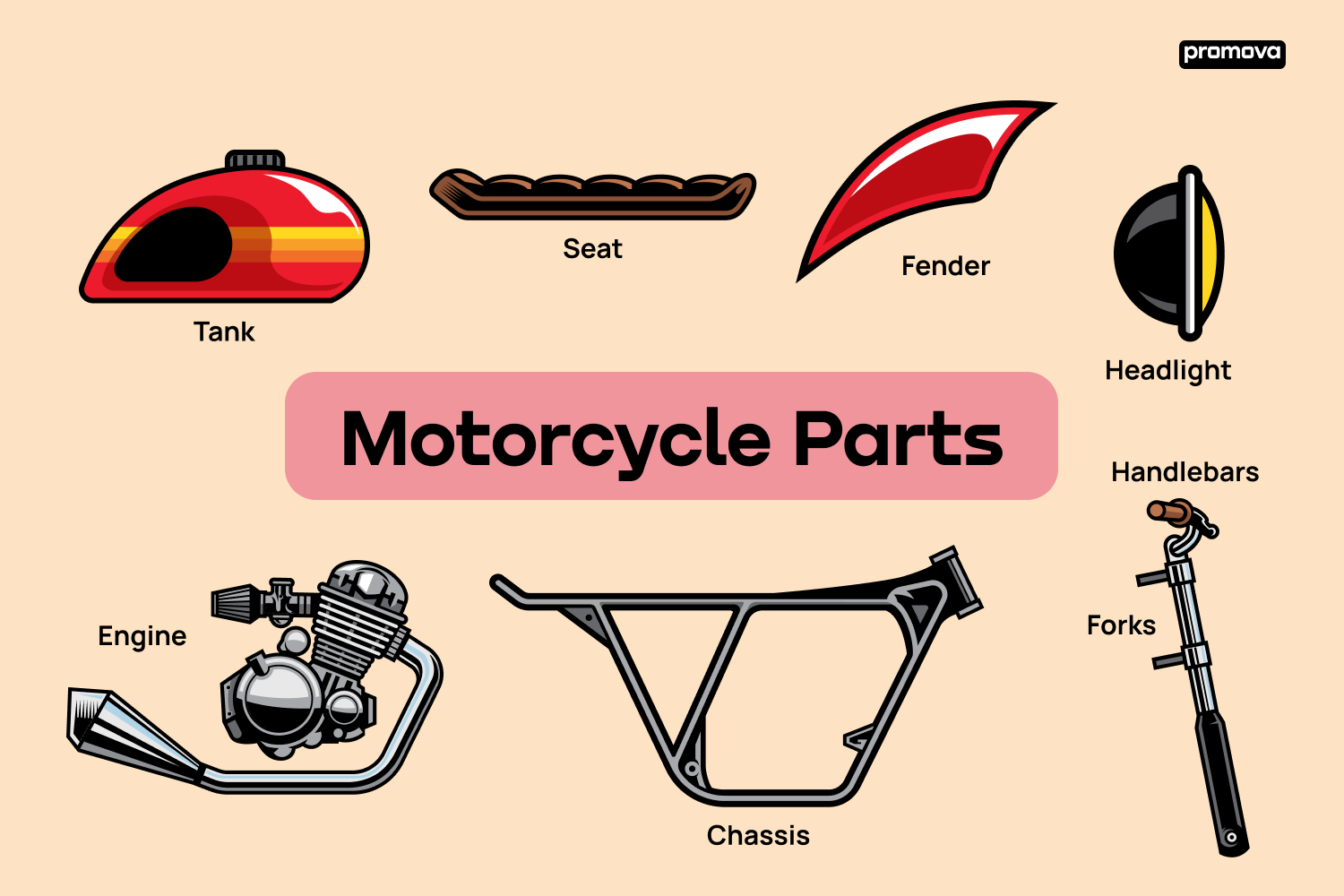Top Performance Tips Using Motorbike Components NZ
Top Performance Tips Using Motorbike Components NZ
Blog Article
Discover the Necessary MotorBike Components You Need for Optimum Performance
Comprehending the vital parts of a bike is basic for attaining peak efficiency. Each part, from the engine to the braking system, plays an important duty in total performance and security. Normal upkeep can protect against unexpected failings and improve the riding experience. Several cyclists ignore the ins and outs of these systems. Uncovering exactly how they interact can bring about a more reliable trip. What vital parts should every rider prioritize?
The Engine: The Heart of Your Motorcycle
The engine offers as the core element of a motorbike, driving its performance and specifying its abilities. It is responsible for converting gas into mechanical energy, which powers the bike forward. Various types of engines are utilized, consisting of single-cylinder, V-twin, and inline setups, each offering unique characteristics fit for various riding styles and functions. The engine size, normally gauged in cubic centimeters (cc), significantly influences performance, with larger engines generally providing even more power and torque.Furthermore, the engine's style and technology, such as gas injection systems or air-cooling versus liquid-cooling, impact performance and dependability. Upkeep is vital for peak operation; elements like routine oil modifications and checking trigger plugs guarantee durability. Riders frequently think about an engine's responsiveness and level of smoothness, as these features improve the overall riding experience. Ultimately, the engine continues to be an important element that defines not just the motorcycle's performance however also the rider's connection to the equipment.
The Transmission: Changing Gears Smoothly
The transmission plays an important duty in a motorcycle's efficiency, especially in the technicians of gear moving. Understanding how to move gears efficiently can improve the total riding experience, while regular upkeep warranties peak capability. Appropriate focus to these elements can significantly impact the durability and effectiveness of the motorbike.

Equipment Shifting Mechanics
Smooth gear shifting is crucial for perfect motorbike performance, greatly affecting both acceleration and control. The mechanics of gear shifting involve the communication between the clutch, equipment lever, and transmission system. When a biker engages the clutch, it disengages the engine from the transmission, permitting a gear adjustment without harming the components. A well-timed launch of the clutch, incorporated with precise motion of the equipment bar, assists in a seamless change in between gears. This procedure assures that the engine operates within its best power band, improving performance. Motorcycle Parts Auckland. Additionally, comprehending the gear proportions and their effect on rate and torque can assist motorcyclists make educated selections during shifts, inevitably adding to a more pleasurable and responsive riding experience
Maintenance Tips Value
Routine maintenance plays a vital role in ensuring that the transmission system runs effectively, enabling smooth gear changes. Regularly inspecting and altering the transmission fluid is essential, as old fluid can lead to increased friction and wear. Furthermore, checking the clutch for wear warranties peak involvement and disengagement, stopping slippage throughout gear adjustments. Lubrication of relocating components is just as vital to lower friction and improve efficiency. Motorbike proprietors ought to additionally keep track of for leakages and unusual noises, as these can indicate underlying problems. By adhering to these maintenance suggestions, cyclists can prolong the life-span of their transmission system, ensuring that equipment shifts stay smooth and adding to the total performance of their motorbike.
The Braking System: Ensuring Safety on Every Trip
Braking systems are essential elements that straight influence a motorcycle's safety and security and performance. They contain numerous components, consisting of brake pads, blades, calipers, and hydraulic lines, all collaborating to ensure effective deceleration. The type of braking system-- generally either disc or drum-- impacts responsiveness and stopping power.Regular maintenance is necessary to support peak efficiency; used brake pads can bring about lowered efficiency and increased quiting distances. In addition, the high quality of brake fluid should be kept an eye on, as it can absorb moisture with time, compromising braking efficiency.Riders ought to likewise consider the significance of anti-lock braking systems (ABS), which prevent wheel lockup throughout sudden quits, improving general safety and security. Effectively functioning brakes are not nearly stopping; they instill self-confidence in the cyclist, permitting safer navigation via various surfaces. Inevitably, a dependable braking system is important for appreciating every ride with satisfaction.
The Suspension: Enhancing Comfort and Control
A well-functioning suspension system greatly adds to a motorbike's general performance, complementing the efficiency of the stopping system. The suspension plays a significant duty in absorbing shocks from unequal surfaces, guaranteeing a smoother ride while preserving tire contact with the roadway. This get in touch with is necessary for both stability and control, permitting cyclists to you can try here browse edges with self-confidence and precision.Different types of shock absorber, such as telescopic forks or mono-shocks, use varying levels of comfort and handling. Properly tuned suspension improves responsiveness, giving the cyclist with a much more connected feel to the motorcycle. Normal maintenance checks are necessary to establish the suspension elements, consisting of springs and dampers, are operating at their ideal. An effective suspension system not just elevates the riding experience but likewise adds to the longevity of various other motorbike parts by lessening damage. Consequently, buying top quality suspension is vital for any significant motorbike lover.
The Tires: Connecting You to the Road
Tires play a crucial function in a motorbike's efficiency, serving as the main web link in between the rider and the road. Recognizing the various sorts of tires readily available can considerably impact handling and safety. In addition, normal maintenance is vital to ensure peak tire performance and longevity.
Tire Enters Explained
Exactly how do various tire types affect a motorbike's efficiency? Tire types play an essential duty in identifying a motorcycle's handling, security, and hold. Sport tires, designed for high performance, offer boosted grip and responsiveness on smooth roads, making them optimal for competing and hostile riding. On the other hand, exploring tires focus on toughness and comfort, offering a smoother adventure for long-distance travel. Off-road tires, characterized by their sturdy step patterns, master traction on unpaved surface areas, appropriate for journey fanatics. Additionally, dual-sport tires mix characteristics from both on-road and off-road classifications, dealing with versatile riding requirements. Eventually, selecting the ideal tire kind is important for optimizing efficiency, making certain safety, and enhancing the general riding experience.
Upkeep Tips Offered
While riding when driving, keeping optimal tire problem is crucial for safety and security and efficiency. Consistently checking tire pressure is essential, as under-inflated tires can cause poor handling and boosted wear. It is recommended to evaluate step depth frequently; used tires concession grip and stability. Additionally, bikers need to try to find signs of damages, such as bulges or cracks, which can suggest the requirement for substitute. Rotating tires regularly guarantees even use, enhancing longevity. Moreover, keeping tires tidy from particles and avoiding too much visuals can lengthen their life-span. Lastly, preserving correct positioning and equilibrium adds to come to a head performance, minimizing anxiety on various other bike parts. Sticking to these maintenance pointers will considerably improve the total riding experience.
The Fuel System: Fueling Efficiency and Performance
The gas system plays a crucial role in taking full advantage of a motorcycle's check efficiency and performance, as it assures the optimal delivery of fuel to the engine. It makes up numerous crucial elements, consisting of the fuel tank, fuel pump, fuel filter, and fuel injectors or carburetor. Each component should operate efficiently to guarantee a effective and smooth ride.The gas container stores fuel and supplies it to the engine via the gas pump, which creates the essential pressure. A gas filter stops contaminants from entering the engine, while the injectors or carburetor mix gas with air for combustion.Proper upkeep of the gas system is important; a clogged filter or malfunctioning injector can result in lowered efficiency and increased fuel intake. By confirming that the fuel system operates effectively, cyclists can take pleasure in enhanced throttle feedback, far better gas economic situation, and on the whole enhanced riding experience.
The Electrical System: Powering Your Ride
An effective electric system is important for the total performance and safety and security of a motorcycle, as it powers crucial components such as the ignition, lighting, and numerous digital systems. This system consists of the battery, which stores energy, and the generator, in charge of generating power while the engine runs. The wiring harness links these components, guaranteeing dependable power distribution.Additionally, fuses shield the system from overloads, while relays help manage high-current devices with low-power signals. A properly maintained electrical system boosts efficiency by making certain smooth starts and constant procedure of signals and lights, important for cyclist exposure and safety.Regular checks of the battery's cost and connections are important for preventing electric failings. Riders should likewise inspect circuitry for wear and tear, guaranteeing all components work preferably. Eventually, a robust electric system adds substantially to the total performance and integrity of the motorbike.
Frequently Asked Inquiries
How Typically Should I Change My Motorbike's Battery?
The regularity of motorcycle battery substitute depends on use and upkeep (Motorcycle Spares Christchurch). Generally, batteries ought to be replaced every three to 5 years. Regular checks can aid identify when a substitute is essential for peak performance
What Devices Do I Need for Standard Bike Maintenance?
For standard motorcycle maintenance, one requires crucial devices such as a socket set, wrenches, screwdrivers, pliers, tire stress scale, and a torque wrench. These tools facilitate reliable maintenance and guarantee the motorbike runs effectively and safely.
How Can I Improve My Motorcycle's The rules of aerodynamics?
To boost motorcycle aerodynamics, one need to take into consideration changing fairings, making use of windscreen expansions, maximizing body position, and minimizing total weight. These modifications help reduce drag, boosting security and gas effectiveness during trips.
What Are the Indicators of a Failing Electrical System?
Signs of a falling short electric system include lowering lights, difficulty starting, uneven tool readings, and blown fuses. Oem Parts New Zealand. Uncommon scents or deterioration around battery terminals might also indicate underlying concerns needing instant attention for security and performance

Exactly how Do I Choose the Right Oil for My Motorcycle?
When picking oil for a bike, one ought to consider the maker's requirements, viscosity rankings, and the kind of riding. Additionally, artificial versus traditional oil can impact performance and engine protection, influencing the decision considerably. The engine dimension, generally determined in cubic centimeters (cc), considerably affects efficiency, with larger engines normally offering more power and torque.Furthermore, the engine's style and modern technology, such as gas shot systems or air-cooling versus liquid-cooling, impact efficiency and integrity. A well-functioning suspension system significantly adds to a motorbike's general efficiency, matching the effectiveness of the braking system. check this The gas system plays an essential role in making the most of a motorbike's efficiency and performance, as it assures the ideal delivery of fuel to the engine. A gas filter prevents pollutants from getting in the engine, while the injectors or carburetor mix fuel with air for combustion.Proper maintenance of the gas system is crucial; a clogged up filter or malfunctioning injector can lead to lowered performance and increased fuel intake. A well-maintained electric system improves efficiency by ensuring smooth beginnings and regular operation of signals and lights, essential for biker visibility and safety.Regular checks of the battery's charge and connections are essential for preventing electric failures.
Report this page